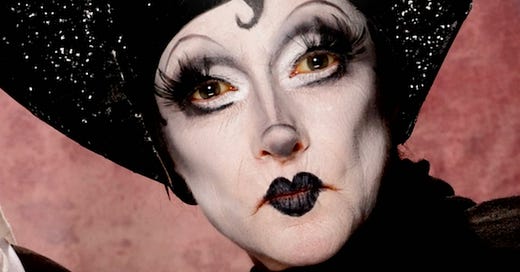Queenie Toot, and the Mothers Like Her
“The fact that you’ve come here is such an amazing gesture of love.” — RuPaul
When Morgan Wallen declared “Get me to God’s country,” he was clearly referring to the RuPaul’s Drag Race workroom, a space I, too, would want to be, after meeting five new drag queens on the latest episode of the landmark series. There was the boisterous Sassy Star, the thundering Salchicha Sparkles, the sassy Nunya Bidness, the audacious Mimi Lovely and the reluctant Queenie Toot. See, within this week’s episode of Drag Race was an Independent Spirit Award-worthy short film about the life and times of Susan Shaevitz and her son, Benjamin (aka Queenie and Suzie Toot), the story of a soft spoken mother and the son she had a hard time hearing.
And while I loved and was moved by each of the stories this week, none vibrated for me more than Queenie’s, a story that deserves unpacking. It began from the moment the parents were first introduced as part of the makeover challenge, a tradition that dates back to the show’s first season, when the queens were tasked with making over professional female fighters. This, however, was the first time (All Stars withstanding) that the show had presented the queen’s parents for the makeover. Here were the queens reactions:
“I can’t believe my mom is here; she is everything to me.” — Sam Star
“I missed my dad so much. That is my homie back home!” — Onya Nurve
“‘Hey queen!’ That is the most amazing thing to hear from him because out of this competition, that’s the first thing my dad says to me.” — Jewels Sparkles
“It is my real, actual biological mother at Rupaul’s Drag Race. [Squeals]” — Lexi Love
“It’s a bit of a scary thing to have my mom suddenly here in my world.” — Suzie Toot
And thus kicked off a storyline not often told. See, a lot of queer kid stories around parents fall into one of two buckets: acceptance or a lack of acceptance. But this added a different texture: acceptance without a connection. But it also offered something even more nuanced: a desire from Queenie to try. At a time when LGBTQ+ rights are being stripped from us, particularly among our most marginalized, as well as our humanity questioned, Drag Race is — and has been — a critical anecdote in the fight for quality, especially for young people. It shows a world where queerness is utopia, where it is neither homogeneous nor rare and where our stories can be imprinted in a history book of sorts. Let’s dive into what I found to be one of the most moving arcs in Drag Race herstory.





